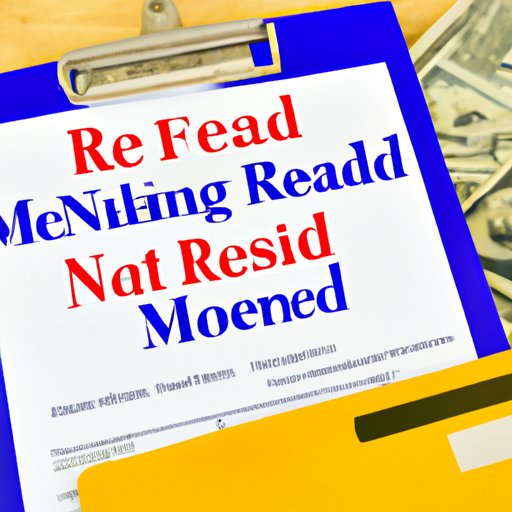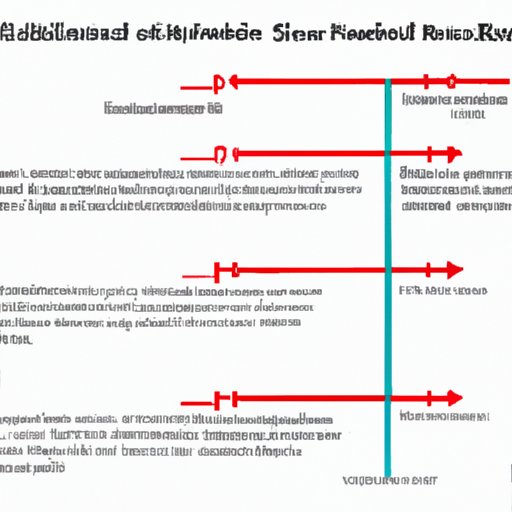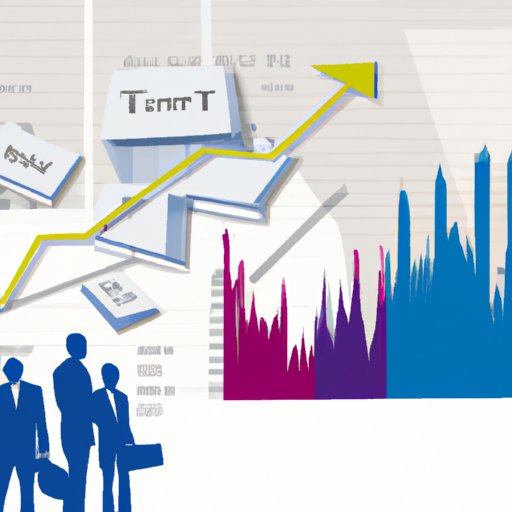Introduction
The Federal Reserve (the Fed) is the central banking system of the United States and is responsible for setting monetary policy, including the federal funds rate. This rate is the interest rate at which banks lend money to each other overnight, and it affects a variety of financial products, including mortgage loans, credit cards, and savings accounts. When the Fed raises its rate, it has a ripple effect on the entire economy, and it can have a significant impact on your personal finances.
Analyzing the Impact of Federal Reserve Rate Hikes on Your Personal Finances
When the Fed raises its rate, it can affect your personal finances in a number of ways. Let’s take a look at how rate hikes may affect your credit card debt, homeownership, and savings accounts.
Credit Card Debt
Credit card debt can be particularly vulnerable to rate hikes. According to a study by the Federal Reserve Bank of New York, the average household with credit card debt has about $8,200 in balances. That debt can quickly increase when rates rise. The same study found that for every one percentage point increase in the prime rate, households with credit card debt saw their minimum payments increase by nearly 4%.
Homeowners
Homeowners can also be affected by rate hikes. If you have an adjustable-rate mortgage (ARM), your monthly payments will likely increase when rates go up. A fixed-rate mortgage, on the other hand, may not be affected by rate hikes since the interest rate is already set. But if you’re looking to refinance your home loan, you may find that the new rates are higher than what you’re currently paying.
Savings Accounts
Savings accounts are also affected by rate hikes. When the Fed increases its rate, banks are more likely to offer higher interest rates on their savings accounts. This means that if you’re looking to save for the future, you may be able to earn more on your money. However, it’s important to remember that savings accounts don’t typically offer the highest returns, so it’s important to shop around and compare rates before deciding where to put your money.

How to Prepare for a Fed Rate Increase and Protect Your Money
While rate hikes can be beneficial in some cases, they can also be detrimental to your financial health. Here are a few steps you can take to prepare for a rate increase and protect your money:
Creating an Emergency Fund
It’s always a good idea to create an emergency fund in case of unexpected expenses. This is especially true during periods of rising rates, as higher rates can mean higher costs for borrowing money. By having an emergency fund, you can avoid taking out high-interest loans or using a credit card to cover unexpected expenses.
Refinancing Loans
If you have a loan with a variable interest rate, such as a car loan or student loan, you may want to consider refinancing it to a fixed rate. This can help you lock in a lower rate and ensure that your payments stay the same even if rates continue to increase.
Shopping Around for Better Interest Rates
When rates rise, it’s wise to shop around and compare interest rates on various financial products. For example, if you’re looking for a new credit card, you may find that some cards offer lower rates than others. The same is true for savings accounts, loans, and mortgages. Taking the time to research your options can help you find the best deals and maximize your savings.
Exploring the Relationship Between Interest Rates and Credit Card Debt
When interest rates increase, credit card debt can become more expensive. This is because credit card companies typically charge a variable interest rate that is tied to the prime rate. As the prime rate increases, so does the interest rate on your credit card balance.
Understanding Interest Accrual
It’s important to understand how interest accrues on your credit card debt. Credit card companies typically calculate interest on a daily basis, meaning that each day your balance is subject to interest charges. The longer you carry a balance, the more interest you will pay. This is why it’s important to pay off your balance in full each month to avoid accumulating too much interest.
Managing Credit Card Debt
If you have credit card debt, it’s important to manage it responsibly. Make sure you make your payments on time each month and pay more than the minimum amount due. If possible, try to pay off your debt as quickly as you can to reduce the amount of interest you pay over time. You may also want to consider transferring your balance to another card with a lower interest rate or signing up for a 0% balance transfer offer.

What Higher Interest Rates Mean For Homeowners
Higher interest rates can also affect homeowners. If you have an adjustable-rate mortgage (ARM), your monthly payments will likely increase when rates go up. An ARM typically has a lower initial interest rate than a fixed-rate mortgage, but the rate can change over time depending on market conditions.
Adjustable-Rate Mortgages
An adjustable-rate mortgage (ARM) has an initial period where the interest rate is fixed, followed by a period where the rate can fluctuate. During this period, the interest rate is tied to an index, such as the London Interbank Offered Rate (LIBOR). When the index increases, so does the interest rate, resulting in higher monthly payments.
Fixed-Rate Mortgages
A fixed-rate mortgage has an interest rate that remains constant throughout the life of the loan. This means that even if the Fed raises its rate, your monthly payments won’t be affected. However, if you’re looking to refinance your home loan, you may find that the new rates are higher than what you’re currently paying.

Understanding the Relationship Between Savings Accounts and Federal Reserve Rate Hikes
When the Fed raises its rate, banks are more likely to offer higher interest rates on their savings accounts. This means that if you’re looking to save for the future, you may be able to earn more on your money. However, it’s important to remember that savings accounts don’t typically offer the highest returns, so it’s important to shop around and compare rates before deciding where to put your money.
High-Yield Savings Accounts
High-yield savings accounts typically offer higher interest rates than traditional savings accounts. These accounts usually require a minimum deposit and a minimum balance, and they often come with additional fees. While these accounts can be a good option for those looking to maximize their savings, it’s important to compare rates and fees before opening an account.
Short-Term Certificates of Deposit
A certificate of deposit (CD) is a type of savings account that requires you to keep your money in the account for a certain period of time. CDs typically offer higher interest rates than traditional savings accounts, but they also require you to keep your money in the account for a predetermined amount of time. If you need access to your money before the CD matures, you may incur a penalty.

Examining the Impact of Rising Rates on Investing Strategies
Rising interest rates can also affect your investing strategy. Here are a few things to consider when developing an investment plan during a period of increased rates:
Stocks
The stock market tends to perform well during periods of rising rates. This is because higher rates tend to encourage investors to shift their money from bonds to stocks, creating demand for stocks and driving prices up. However, it’s important to remember that past performance is not indicative of future results.
Bonds
Bonds tend to perform poorly during periods of rising rates due to the inverse relationship between bond yields and interest rates. As rates rise, bond prices tend to fall, resulting in lower returns for investors. It’s important to remember that the longer the maturity of the bond, the more sensitive it is to changes in interest rates.
Mutual Funds
Mutual funds can be affected by rising rates in different ways, depending on the type of fund. Bond funds may suffer during periods of rising rates, while stock funds may benefit. It’s important to do your research and understand the risks associated with each type of fund before investing.
Maximizing Your Financial Health During a Period of Increased Rates
It’s important to take steps to ensure that your finances remain healthy during periods of rising rates. Here are a few tips to help you maximize your financial health:
Reviewing Your Budget
Take the time to review your budget and look for areas where you can cut back or save money. This can help you free up more money for paying down debt or saving for the future.
Paying Off Debt
If you have any outstanding debt, such as credit card debt or student loans, it’s important to prioritize paying it off. Paying off your debt can help you reduce your interest payments and improve your financial health.
Preparing for Retirement
Saving for retirement is essential, no matter what the economic climate is. It’s important to take the time to review your retirement plan and make sure you’re on track to reach your goals. Consider speaking to a financial advisor about ways to maximize your savings and ensure that you’re prepared for retirement.
Conclusion
Federal Reserve rate hikes can have a significant impact on your personal finances. It’s important to understand how rate hikes may affect your credit card debt, homeownership, savings accounts, and investments. Taking the time to review your budget, pay off debt, and prepare for retirement can help you maximize your financial health during a period of increased rates.
(Note: Is this article not meeting your expectations? Do you have knowledge or insights to share? Unlock new opportunities and expand your reach by joining our authors team. Click Registration to join us and share your expertise with our readers.)
